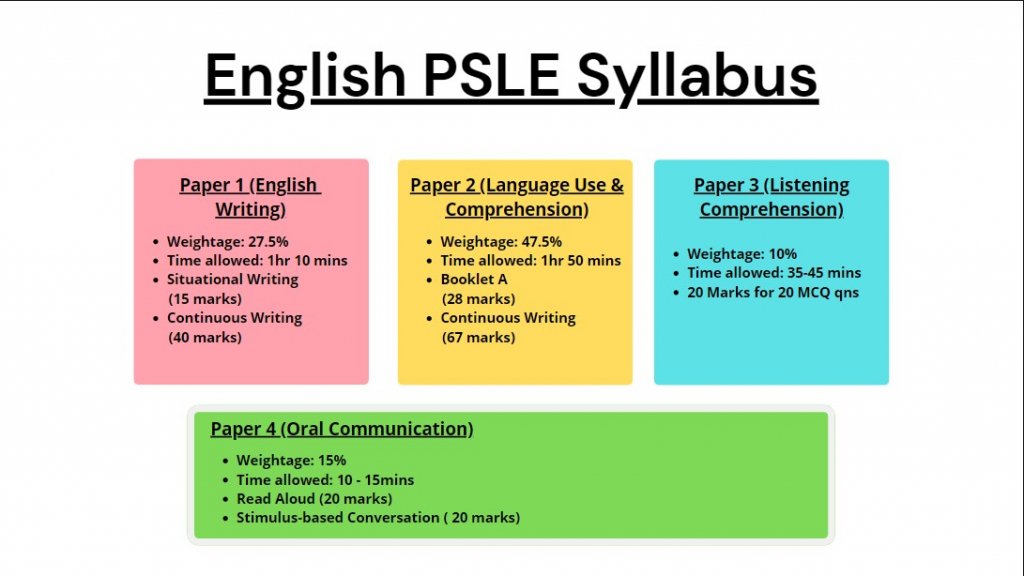
07 Oct How to Ace your PSLE English

It’s your child’s first national exam. It becomes the focus of your lives even when you are at work or doing house chores – conversations, news, and your google search history are all punctuated by this exam. As a parent, you may have started worrying about it at the start of the year, and now that it is right around the corner, there is real pressure to engage with the process thoroughly. Math and Science can be bettered through long hours of practice, so English is your primary concern. Here’s a recap of what your child (and you) can expect:

If the diagram above makes you feel stressed out (or happy that your child is about to finish primary school soon), you will want to read what this article has for you. We have compiled a list of 6 practical tips on how your children can revise their English papers.
1) Practicing time management
Besides being conscious about what they’re writing, it’s crucial to know how much time they have to solve it. Knowing what examination formats to expect gives you the foundation to help them form an examination strategy. Solving questions within a specific time gives them control over the exam situation.
For example, the total time allowed for Paper 2 (Language Use and Comprehension), consisting of Booklets A and B, is 1 hour and 50 minutes. The former consists of MCQ questions and the latter, open-ended questions. The most straightforward way to help your child feel more confident about the exam is to ask which areas they do better in and practice more on the ones they often lose more marks on.
Letting them do mock exams is the best way to see how efficiently they are in allocating an appropriate amount of time for different sections. Every student is different, so there is no right or wrong answer regarding the exact numbers for time allocation.
It is also generally better to start on the booklet that they are confident with first, as it means that they can get through the paper faster and will have more time to spend on the second booklet. The idea here is to train your child to get as many correct answers as possible within the shortest time. Once they get used to it, they might even have more time than usual to check their answers on the actual day of exams.
2) Seek Essential Help
We know what you might be thinking. There’s so much to do. How can I help my child with exams? In these cases, don’t ignore the option to get extra help. Admittedly, parents may not have the time or expertise to help their children prepare for PSLE.
An experienced primary English tutor may already have the groundwork to lay out a customized study plan and specific materials to help your child prepare for the PSLE English exams.
A tutor can help your child focus more on their studies as there will be fewer chances of distractions happening during the tuition session. In addition, an effective tutor can help your child focus more and concentrate on their lessons, so they make more improvements and progress as you go about your day.

3) Read out loud
Time spent reading is time spent learning how to write. But, even at this stage, encouraging your child to read can positively impact them if you help them reflect on what they read. There are tons of practice papers out there that cover every task in Paper 1. Reading them together and discussing ideas on what makes the narrative interesting or what points it has enhances your child’s understanding.
Reading out loud helps your child remember things better and improve fluency in reading which is perfect for Paper 4 (Oral Communication). In addition, having your child read out loud allows them to immerse themselves in an environment where they can learn passively. This can increase their self-confidence when speaking and improve their performance during the oral examination.

4) Review and Reflect on past papers.
The most effective way for your child to find their weaknesses and areas to focus on would be by reviewing their past papers. Your child will already have a sizable collection of old documents. They are treasure troves, especially for last-minute revisions. Comparing old compositions allows them to see mistakes that frequently pop up. In addition, they are excellent for helping your child consider ideas that will improve their writing.
Reviewing past papers also allows your child to check their progress and feel more confident about what they already do well.
5) Parents should speak proper English.
The best way to learn a language is by immersing yourself in the right environment. The learner needs to take part in speaking. It’s not enough for kids to learn alone; parents must participate. Surrounding your kids in an all-English-speaking environment can help them learn passively.
As Singaporeans, it is easy to just jump right onto the first thing we think of and speak it out loud. For most, this could be Singlish or sentences mixed with other languages. It would be awkward initially, but speaking proper English at home can significantly boost your child’s English skills and, perhaps surprisingly, yours too.
6) Psychological Preparation
It’s not always about learning and studying. Doing your best to ensure your child feels as confident as they can be on the day of the exam is beneficial regardless of their academic skills. If your child enters the exam hall feeling stressed out and continuously focusing on his weaknesses, he is already psychologically at a disadvantage. Every child is different, and it is normal for them to be better at one thing than another.
Focusing on their weaknesses is important, but increasing their confidence by reminding them of their strengths is also necessary for their mental well-being.
Conclusions
After reading the tips above, you may be motivated to help your child improve their English immediately. But remember, your child is a human and needs love and rest. Your child is probably just as stressed as you, and if they are already doing their best for their studies, the best action to take may be to ask them to take a break.
We wish you and your child all the best in PSLE.


